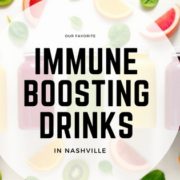What Causes Allergies in Nashville? ENT Doctors Weigh In…
While Nashvillians tend to be a good-natured bunch, there are three things we like to complain about: traffic, shopping for a home (no complaints from the sellers!), and allergies.
If you recently moved to Nashville and find yourself wondering, “Were my allergies this bad before I came here?” you may be relieved to know you’re not mistaken. Wherever you came from, the allergies probably weren’t as bad they are here in Nashville! (Okay, maybe “relief” isn’t the right emotion – but, at least you’re right, right?)
Nashville Ranks in the Top 30 for Allergies
Every season, the Asthma and Allergy Foundation of America (AAFA) releases a report on the Allergy Capitals of the U.S. In Spring 2016, Nashville ranked at #29, pushed further down the list from its previous ranking at #23. (If it makes you feel any better, Memphis ranked #2 and consistently appears at the top of allergy and asthma lists.)
In the Fall 2016 allergy season, Nashville ranked #27 (down from #20).
What Causes Allergies in Nashville?
Springtime brings a variety of blooming flowers and budding trees, which create the perfect storm for pollen-sensitive residents. With long growing seasons and a geography that causes air to “sit” over the Middle Tennessee region for extended periods, pollens and other irritants can accumulate in the area, irritating sinuses for weeks or months on end.
In the fall, ragweed (“hay fever”) can cause those infamous symptoms of sneezing, runny nose, congestion, headache, and irritation of the throat and eyes. Of course, our homes can also act as host to a variety of allergens, from dust, mold, and mites to pet dander.
Allergy Testing Methods
Nashville ENT specialists at St. Thomas Medical Group have several methods for screening allergies.
-
- Skin Prick Testing: The most common form of testing, the skin prick method involves creating several pricks on the skin with droplets of various allergens. After 20 minutes, test results can be read. Results may prompt further testing. (See below.)
- Intradermal Dilutional Testing (IDT): Using this method, the healthcare provider injects small amounts of allergens under the skin of the upper arm. The test can take three hours.
- Modified RAST (mRAST): This blood test measures the amount of ImmunoglobinE (IgE) specific to each allergen. IgE is an antibody the immune system produces in reaction to an allergen. These antibodies are what cause the symptoms you have observed as an “allergic reaction.” It can take two to three weeks to receive results from the lab.
Treatments for Nashville Allergies
There are several methods that may be recommended to you for managing allergy symptoms. These may include:
-
- Medication Therapy: Antihistamines, nasal sprays and other drugs can be helpful in many cases for reducing allergy symptoms. Many of these drugs are available over the counter without a prescription.
- Desensitizing Immunotherapy (IT): Also known as “allergy injections,” immunotherapy is an option for some patients. Injections may be done weekly in a physician’s office; some immunotherapy drugs are taken orally under the tongue twice a week at home.
- Avoidance Therapy: As you may guess, this therapy is based on strategically eliminating or reducing exposure to known allergens. Your ENT specialist may be able to recommend air filters, cleaning methods, household modifications, and lifestyle changes that can help you reduce exposure to known allergens.
Find a Ear, Nose & Throat Doctor In Nashville, TN
St. Thomas Medical Group is home to three ENT specialists. Meet:
Mitchell K Schwaber, M.D.
Steven Enrich, M.D.
Matthew Speyer, M.D.
For more information or to schedule an appointment with a Nashville ear, nose and throat specialist at St. Thomas Medical Group, call +1 (615) 297-2700.






